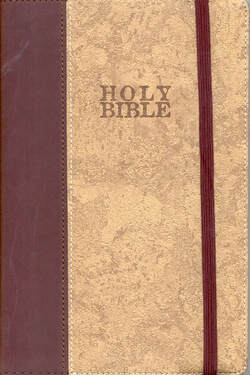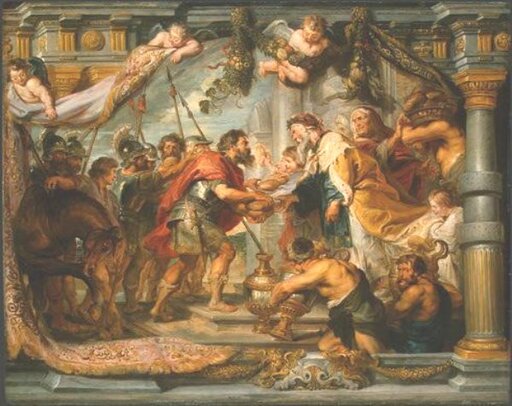Hebrews 4:14-5:10 Lesson 420
Read both the "King James Bible" and the "New Living Translation."
In this lesson:
Jesus is our High Priest.
Count Jesus' credentials listed in verses 4:14-5:3.
King Melchizedek.
This passage begins the central theme of Hebrews.
Jesus is compared to the Jewish priesthood.
It runs through verse 10:39 (lesson 428).
Abraham makes King Melchizedek an offering.
Painting by Sir Peter Paul Rubens (1577 - 1640).
Painting by Sir Peter Paul Rubens (1577 - 1640).
Who was...
The Great High Priest -
Jesus became our Great High Priest (Hebrew 3:1) when He was sacrificed on the cross (Romans 8:34; 1 Timothy 2:5; Hebrews 2:17; 4:14; 7:27; 9:26; 10:10). Before Jesus, a Jewish High Priest was the mediator between God and mankind. They offered up prayers and sacrifices for the forgiveness of sins (Leviticus 4:3). We no longer need a mediator. Thanks to Jesus, the final sacrifice, we now have direct access to God.
Moses' brother Aaron was the first High Priest, followed by his son Eleazar (Numbers 20:28; 27:21). The Jewish High Priest supervised the lower priests and had the final say on matters of theocracy. The High Priest was also the civil leader of Israel. High Priests enjoyed a lifetime position (Exodus 40:15), but when the Romans controlled Israel, they frequently replaced the ones they didn't like. Most Jews resented this intrusion into their religious matters.
Aaron -
Aaron was the son of Amram the Levite and Jochebed (Exodus 6:20), Moses' older brother and his spokesman (Exodus 4:16; 7:2). He was also Moses' second in command and the first Jewish High Priest. Moses killed an Egyptian and was forced to flee Egypt. Forty years later, God sent Aaron to find Moses (Exodus 4:27) and help him lead the Israelites out of Egyptian slavery. When Moses went to receive the Ten Commandments from God, Aaron, two of his four sons, and seventy elders accompanied him partway up Mount Sinai (Exodus 24:1-2). While they waited for Moses to return, Aaron made a pagan idol for the Israelites to worship, a golden calf (Exodus 32:2-5). God forgave Aaron and gave him the power to end a plague that killed 14,700 Israelites (Numbers 16:1-50). As the first High Priest, Aaron was a foreshadowing of Christ (Exodus 28:1; 29:7) and helped prepare the Jews for the coming Messiah. But like Moses, Aaron died before reaching the promised land (Numbers 20:12; 20:23-29). After his death at the age of 123, Aaron's rod was preserved as a memorial (Hebrews 9:2-6) and kept in the Ark. The Old Testament calls for all Jewish priests to be descendants of Aaron (Exodus 28:1; 39:41; Leviticus 1:5; 1:7-8; 1:11). Aaron is also mentioned in the Koran and honored by Muslims.
Melchizedek -
During the time of Abraham, Melchizedek was a Canaanite priest and the King of Salem, now Jerusalem (Genesis 14:18). He was called the "King of righteous" and "priest of the most high God." Melchizedek congratulated Abraham on his military victory over King Cherdorlaomer of Elam and his allies. He brought Abraham's victorious army "bread and wine." In turn, Abraham tithed Melchizedek ten percent of the loot captured in the conflict (Hebrews 7:2). "The Epistle to the Hebrews" tells us that Melchizedek was a greater priest than Aaron because -
1) even Abraham paid Melchizedek tithes (7:2; 7:4),
2) Levi (an ancestor of Aaron and thus all Jewish priests) paid tithes through Abraham to Melchizedek (7:9),
3) Melchizedek blessed Abraham (Genesis 14:19; Hebrews 7:1; 7:6). The person with authority to bless is greater than the person receiving the blessing (7:7),
4) he was "a priest forever" (7:8; 7:16).
Melchizedek's story foreshadowed Jesus (Psalm 110:4). Just as Aaron was a High Priest for the Israelites, Jesus is the High Priest for all mankind. You can learn more about King Melchizedek in Genesis 14:17-24.
Additional note: Jewish tradition alleges that Melchizedek was Noah's son, Shem. But this cannot be proven.
The Great High Priest -
Jesus became our Great High Priest (Hebrew 3:1) when He was sacrificed on the cross (Romans 8:34; 1 Timothy 2:5; Hebrews 2:17; 4:14; 7:27; 9:26; 10:10). Before Jesus, a Jewish High Priest was the mediator between God and mankind. They offered up prayers and sacrifices for the forgiveness of sins (Leviticus 4:3). We no longer need a mediator. Thanks to Jesus, the final sacrifice, we now have direct access to God.
Moses' brother Aaron was the first High Priest, followed by his son Eleazar (Numbers 20:28; 27:21). The Jewish High Priest supervised the lower priests and had the final say on matters of theocracy. The High Priest was also the civil leader of Israel. High Priests enjoyed a lifetime position (Exodus 40:15), but when the Romans controlled Israel, they frequently replaced the ones they didn't like. Most Jews resented this intrusion into their religious matters.
Aaron -
Aaron was the son of Amram the Levite and Jochebed (Exodus 6:20), Moses' older brother and his spokesman (Exodus 4:16; 7:2). He was also Moses' second in command and the first Jewish High Priest. Moses killed an Egyptian and was forced to flee Egypt. Forty years later, God sent Aaron to find Moses (Exodus 4:27) and help him lead the Israelites out of Egyptian slavery. When Moses went to receive the Ten Commandments from God, Aaron, two of his four sons, and seventy elders accompanied him partway up Mount Sinai (Exodus 24:1-2). While they waited for Moses to return, Aaron made a pagan idol for the Israelites to worship, a golden calf (Exodus 32:2-5). God forgave Aaron and gave him the power to end a plague that killed 14,700 Israelites (Numbers 16:1-50). As the first High Priest, Aaron was a foreshadowing of Christ (Exodus 28:1; 29:7) and helped prepare the Jews for the coming Messiah. But like Moses, Aaron died before reaching the promised land (Numbers 20:12; 20:23-29). After his death at the age of 123, Aaron's rod was preserved as a memorial (Hebrews 9:2-6) and kept in the Ark. The Old Testament calls for all Jewish priests to be descendants of Aaron (Exodus 28:1; 39:41; Leviticus 1:5; 1:7-8; 1:11). Aaron is also mentioned in the Koran and honored by Muslims.
Melchizedek -
During the time of Abraham, Melchizedek was a Canaanite priest and the King of Salem, now Jerusalem (Genesis 14:18). He was called the "King of righteous" and "priest of the most high God." Melchizedek congratulated Abraham on his military victory over King Cherdorlaomer of Elam and his allies. He brought Abraham's victorious army "bread and wine." In turn, Abraham tithed Melchizedek ten percent of the loot captured in the conflict (Hebrews 7:2). "The Epistle to the Hebrews" tells us that Melchizedek was a greater priest than Aaron because -
1) even Abraham paid Melchizedek tithes (7:2; 7:4),
2) Levi (an ancestor of Aaron and thus all Jewish priests) paid tithes through Abraham to Melchizedek (7:9),
3) Melchizedek blessed Abraham (Genesis 14:19; Hebrews 7:1; 7:6). The person with authority to bless is greater than the person receiving the blessing (7:7),
4) he was "a priest forever" (7:8; 7:16).
Melchizedek's story foreshadowed Jesus (Psalm 110:4). Just as Aaron was a High Priest for the Israelites, Jesus is the High Priest for all mankind. You can learn more about King Melchizedek in Genesis 14:17-24.
Additional note: Jewish tradition alleges that Melchizedek was Noah's son, Shem. But this cannot be proven.
Study Tip:
"Read the Bible with an open mind. Don't read into its passage's ideas that are not there.
Try to search out fairly and honestly the main teachings and lessons of each passage."
Henry Hampton Halley, minister and religious writer (1874-1965).
"Read the Bible with an open mind. Don't read into its passage's ideas that are not there.
Try to search out fairly and honestly the main teachings and lessons of each passage."
Henry Hampton Halley, minister and religious writer (1874-1965).












